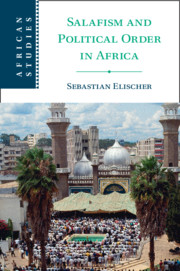Book contents
- Salafism and Political Order in Africa
- African Studies Series
- Salafism and Political Order in Africa
- Copyright page
- Dedication
- Contents
- Figures
- Maps
- Tables
- Preface
- Introduction
- 1 Concepts, Cases, and Variation
- 2 Critical Junctures and the Formation of State-Led National Islamic Associations
- 3 Missed Opportunities and the Formation of Islamic Federations
- 4 The State as Demobilizer of Activist Salafism
- 5 The State as Enabler and Radicalizer of Activist Salafism
- 6 From Theory-Generation to Theory Testing
- 7 Autocratic Legacies, the State, and Salafism in Africa
- Conclusion
- Appendix I
- Bibliography
- Index
- African Studies Series
6 - From Theory-Generation to Theory Testing
Published online by Cambridge University Press: 06 August 2021
- Salafism and Political Order in Africa
- African Studies Series
- Salafism and Political Order in Africa
- Copyright page
- Dedication
- Contents
- Figures
- Maps
- Tables
- Preface
- Introduction
- 1 Concepts, Cases, and Variation
- 2 Critical Junctures and the Formation of State-Led National Islamic Associations
- 3 Missed Opportunities and the Formation of Islamic Federations
- 4 The State as Demobilizer of Activist Salafism
- 5 The State as Enabler and Radicalizer of Activist Salafism
- 6 From Theory-Generation to Theory Testing
- 7 Autocratic Legacies, the State, and Salafism in Africa
- Conclusion
- Appendix I
- Bibliography
- Index
- African Studies Series
Summary
The chapter tests the theory derived from the empirical chapters. It provides additional empirrical evidence that countries with organizational gatekeepers are capable of undermining homegrown jihadi Salafism. It also shows that countries lacking institutional regulatory mechanisms in the Islamic sphere become radicalizers of their domestic Salafi communities.
- Type
- Chapter
- Information
- Salafism and Political Order in Africa , pp. 163 - 187Publisher: Cambridge University PressPrint publication year: 2021

